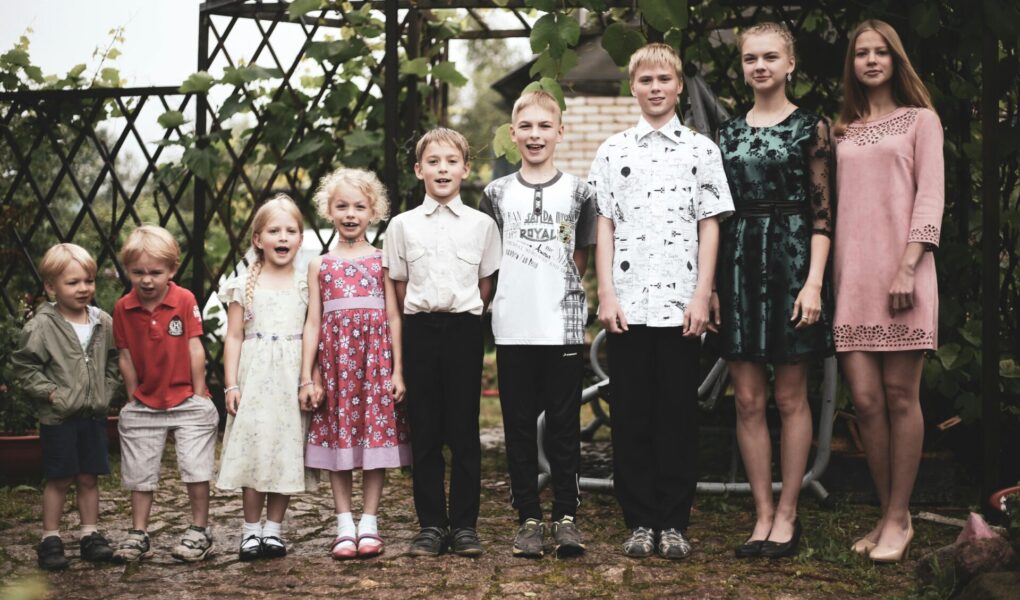Whenever the subject comes up about what’s the easiest age to parent, most of the time you get the same type of answers:
“It never gets easier”, “All stages are hard in their own way”, “Small kids, small problems. Big kids, big problems”, etc.
You get the gist. Most people make it a point to tell you how it will NEVER get easier and that every stage will always have its own obstacles and problems. No one really answers the question.
Here’s the truth – There IS an age when things get easier
Right before it gets hard again.
For those who are candid, they will tell you it’s somewhere between 5 and 10 years old.
During this time, your child is more independent, sleeps through the night, and begins to go to school. This is great because they make new friends and are busy with schoolwork. They are small enough to still be your babies but big enough to do things independently and understand the house rules. They willingly follow their routines and always listen to your directions.
It’s great.
Most of the time, they look at you with wonder and are always happy to spend time with you. There’s no attitude, back talk, or puberty knocking on the door. They are just really chill for the most part.
Why don’t people just say that?
Good question, and one that I have always wondered about myself. I think it stems from the fact that parenting IS hard, and it presents different hurdles throughout the child’s upbringing. There’s also another factor to consider: not everyone enjoys parenting. Because of this, many only point out how hard it is and how they experience little joy from it.
On the other hand, I think there’s a glamorization of the struggles that parenting may bring. Some may enjoy painting themselves as martyrs because of all the sacrifices they have to make in order to raise their children.
Ultimately, it’s very common for people to simply say that all stages of parenting are tough because this allows them to avoid truly opening up or sharing how they really feel as their children are growing up.
This mindset keeps a lot of people trapped and unable to share their true struggles. Instead, they stick to the “parenting always has its challenges” statement. These blanket statements create a separation that does not allow for more meaningful connections. At the same time, it alienates the parent, leaving them unable to share their struggles and feeling isolated.
A bump-free parenting journey is rare

More like non-existent. There is no such thing. It is true that some parents face more challenges than others, especially when the child gets involved in bad things that threaten their health and safety.
However, even if parents do not have to struggle with extenuating circumstances, there will always be challenges and struggles they will have to resolve and face with their children. A child is bound to make mistakes, get into trouble, slack off on chores, fail a test, speak disrespectfully to a parent, etc. All of these things are bumps on the road. They are also normal and to be expected.
Raising children is very rewarding, yes, but it’s also very hard. You have to be on your toes at all times, looking over them and making sure they are learning and applying the values you have taught them at home. You always have to be vigilant, observing their behavior, and be ready to correct—or sometimes reprimand—your child when they are going down the wrong path.
It is a 24/7 job that never ends.
The only time parenting is uneventful and there are no bumps in the road is for parents who practice neglectful parenting. In this situation, the parent does not have to struggle with the curveballs that raising children may throw their way.
You might be interested in reading: What Are Parenting Styles? 8 Most Popular Types Explained
Let’s take a look at the positive aspects and challenges of all stages
Now, for the fun part. Let’s examine the different stages children go through and the positive aspects and challenges they each present.
We’ll start with a quick overview of the main points, followed by a summary that will expand a bit more on each stage.
Babyhood

Positive aspects:
- They are absolutely adorable (the way their little heads smell, the cute baby sounds—everything about them is just so cute).
- Routine is like clockwork (feed, poop, clean, sleep, repeat). You know what to expect and can plan your day around it.
- You know where your child is at all times, and you can keep them safe at all times. There’s a special peace of mind that comes with this.
Challenges:
- They are completely dependent on you. It can be challenging to even go to the bathroom sometimes. Your child might start crying, and you may need to hurry up and get them.
- The routine may begin to affect your mental health because you may feel stuck in a loop. It can be draining to do the same thing over and over again with no change.
- You might be exhausted and sleep deprived. This combination is what makes the baby stage so hard.
- The crying can sometimes drive you mad.
- Some friends may pull away. Your lifestyle change might not be something they want to be a part of. This may leave you feeling lonely and isolated.
In brief:
Babies are so cute and irresistible. Your motherly instincts awaken, and your protective side kicks in. It’s beautiful to hold them in your arms and know they are safe and taken care of. However, taking care of a baby is very physically and mentally challenging. The baby wakes up every few hours, and getting some rest can be really hard. On top of being tired, you still have to feed, clean baby supplies, clean your home, do laundry, eat, use the bathroom, and so much more. It’s exhausting.
This stage is the hardest on the body and mind. No other stage compares to the physical and mental exhaustion you will experience during the baby phase. Furthermore, some friends might pull away because your life has taken a turn different from theirs. This is especially true if your circle is mostly child-free. They may not find it enjoyable to be around a baby, leaving the parent feeling isolated and alone.
Toddler

Positive aspects:
- You can do more fun activities together
- They begin to show you their personality
- They begin to talk and give you a look into their little minds and thoughts
- They become potty trained
- You no longer need to carry a huge diaper bag
Challenges:
- Potty training
- Terrible 2’s and threenage phase
- Tantrums
- Picky eating begins
In brief:
The toddler stage is pretty fun. They begin to walk, talk, and you start to see their personality shine. It’s delightful to see their excited faces when you go on a family trip and they spot something new. They see the world with wonder and curiosity—everything is new and exciting. Once they are potty trained, it’s the absolute best. They can tell you when they need to go to the bathroom, and you no longer need to change diapers.
On the other hand, they can also become little monsters. Anyone who has had a toddler will tell you that the tantrums are no joke. The “terrible twos” are very real! As they get bigger and begin to understand how things work, they want to do everything on their own. They can sometimes be unhelpful helpers too. And just when you think this stage is almost done, the “threenage” stage comes in—little, tiny, teenage-acting toddlers who can be stubborn and moody at times.
But hey, at least they eat solids and sleep through the night. We’ll take that.
Kid

Positive aspects:
- More independent
- You begin to really get to know your child and who they are
- Family activities and vacations are enjoyed more because there are fewer restrictions
- Parents have more free time
- You no longer need to carry bags with back-up clothes or supplies
Challenges:
- It’s a sweet and sour transition: They are growing up, which means they are no longer your babies
- They might get hurt more often
- They destroy their shoes and clothes
In brief:
This is the best stage. Everyone is rested, the family can play together, car seats are almost a thing of the past, and life just gets smoother. It is true that the kids will get into some mischief, but nothing too serious.
During this time, your child becomes more active and might begin to be interested in sports. This is why their shoes and clothes basically get obliterated. You’ll be surprised by how often you’ll have to get them new shoes because the soles will begin to split, or how often they’ll come home with holes in their pants from sliding across the soccer field. Get ready to either become a seamstress or open up your wallet, lol.
Honestly, this stage is the smoothest phase you will encounter. During this time, your child is just being a child—interested in exploring, playing games, having friends, and spending time with you.
This is the eye of the parenthood whirlwind.
Preteen

Positive aspects:
- Very independent
- It’s fun to have more conversations around more complex topics together
- They become more assertive and can express their thoughts better
- They are more intentional with their gestures of affection
- They begin to explore their interests and discover their talents more in-depth
Challenges:
- Mood swings
- They start to give parents more attitude (and eye rolls)
- Since puberty starts to set in, they begin to…. well… smell (more like a stench, lol)
- Patience can sometimes be scarce
In brief:
The preteen stage can be challenging at times. One moment, they are the little kids you have always known, and the next, they are almost-teens who do not want to be bothered. Puberty takes them on a rollercoaster ride of emotions and constant change. This can make them irritable. A lot of change is going on with their bodies, and the social structure at school that they have always known is also changing. This is a time of transformation that they have to adjust to. Because of this, they may feel frustrated with everything and everyone around them.
However, they are still the sweet children you have always known. There are just different layers to them now than what you were accustomed to. You just need to adjust to these changes alongside them. Enjoy the person they are becoming and take part in the things that interest them. Also, make time to introduce them to the things that interest you. Who knows, you might even find something that the whole family can enjoy together.
You might notice your child sticking around when you are having adult conversations. This is because they are growing and are beginning to better understand the complexities of relationships and situations. They are beginning their journey into adulthood.
Everyone experiences this stage differently. For some, it may be a bit challenging, and for others, it might be just a bumpy ride. Nonetheless, most will agree that this is when things get a little more difficult and complex. You will come across some situations where you will have to sit back and think about how you should proceed.
Teenager

Positive aspects:
- Mostly independent
- You get a peek of the adult in them who is beginning to emerge
- Begin to take on their own responsibilities
- They begin to plan out their future (career, personal goals, etc.)
- Begin to establish their values and beliefs, which allows for deeper, more meaningful conversations
- If they get a part-time job, they can also chip in for expenses and/or cover their entertainment expenses
Challenges:
- Puberty is in full swing, which makes them moody and irritable
- Might challenge or completely dismiss your authority
- You have to start letting go and allowing them to make their own decisions
- Hard to find a balance in helping to steer them in the right direction and watching them exercise their judgment
- Less control
- Planning family activities can become a little more challenging since everyone has their own schedule and commitments
- May become judgy towards you
- They may not want to be seen with you because hanging out with their parents is embarrassing
In brief:
I had to reach out to some loved ones to complete this last stage since I do not have teenagers yet. Most of my knowledge comes from my own experience growing up as a teen. As we all know, being a teen is easier than raising one, lol.
The overall consensus is that this stage is hard in a very complex way. You find yourself with a mini adult in your hands who is anxiously trying to make it to the finish line but still has some ways to go. It can be challenging to find a balance between trying to steer them in the right direction and allowing them to call their own shots. Oftentimes, you don’t really get a choice, as they will make their own decisions against your advice.
Teens, because of their youth and limited life experience, can be very judgmental towards their parents (and everyone in general). This is normal. However, being on the receiving end of the harsh criticism can be tough.
This is a time when you have to start to let them go and watch them from a further distance than you have ever done before. This stage is full of change. The family dynamics shift, and everyone needs to readjust to the new normal.
In conclusion

The truth is that every stage brings its challenges, just in different ways. Some may be more physically draining, while others may be more emotionally or mentally overwhelming.
Ultimately, I believe that we shouldn’t focus much on which phase is the easiest age to parent or which is the hardest; instead, we should embrace whichever stage we are currently in. Take in the good and get through the bad the best way you can.
My cousin Angie used a great analogy that I want to share with you guys. She said that we shouldn’t see the challenging aspects as negative. Instead, look at them as opportunities for growth and learning. In the same way a seed sprouts, goes through different stages, and then matures to bear fruit, we don’t mourn the seedling that no longer is. Instead, we enjoy each stage and celebrate the growth.
I loved this analogy because it made me think about how we shouldn’t get caught up in the challenges that may come up and get stuck missing how things used to be. The seedling is meant to grow and change. It may need help along the way, and it may look completely different from when it first started, but this change is needed in order to grow into a beautiful flowering tree.
It may sometimes feel as if the sleepless nights will never end or that you will be forever stuck with a moody preteen/teen. But the truth is that this time will go by faster than you can ever imagine.
With that said, one thing is for certain: the kid stage is the smoothest stretch of the journey 😉.





THIS ARTICLE WAS 🔥
Thank you so much! I’m glad you enjoyed it.